The Moment is Us
Rice’s new strategic plan will guide the university’s growth for the next 10 years.
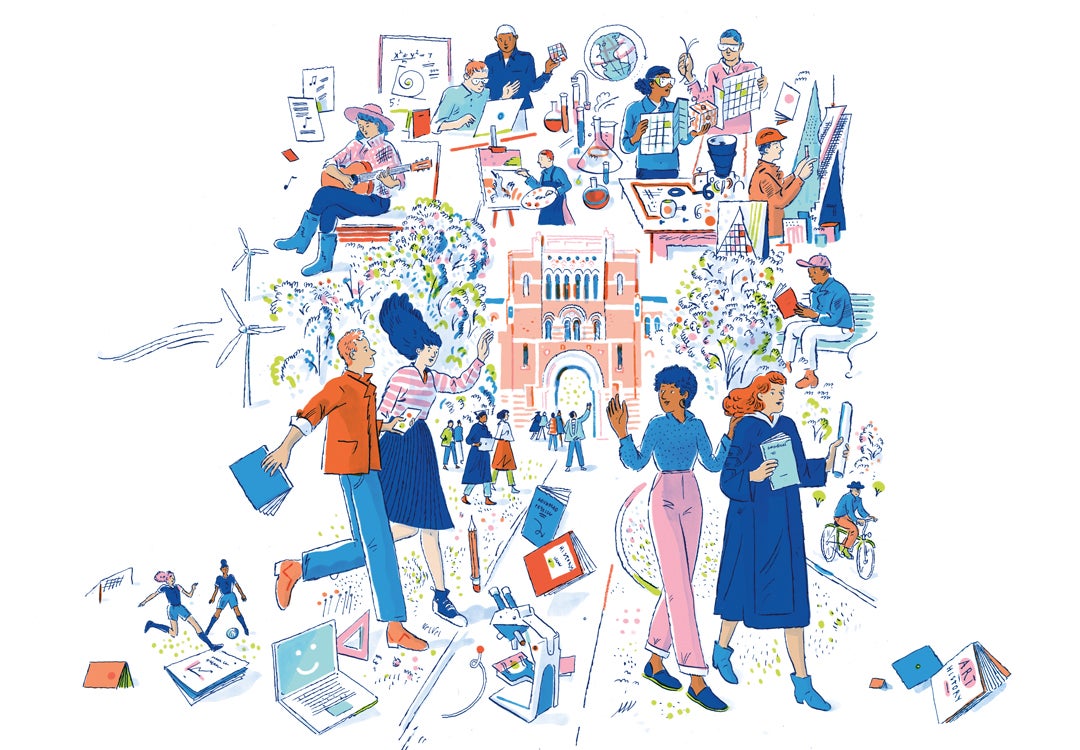
Winter 2025
Illustrations by Peter Oumanski
On Oct. 1, in front of an audience of students, faculty and staff, President Reginald DesRoches and university leaders formally launched a strategic plan that will guide Rice’s direction for the next decade. Meet Momentous: Personalized Scale for Global Impact, a comprehensive plan aligned with a vision of Rice “to be the world’s premier teaching and research university, delivering unparalleled personalized education and propelling breakthrough discovery to transform lives and better humanity.” The result of a two-year process that sought input from Rice students, faculty, staff, alumni, board members and key stakeholders, Momentous leverages Rice’s unique strengths, history and achievements to pursue solutions to the most intractable problems facing our world. The result of this forward-thinking process is a vision that is uniquely Rice.
This 10-year vision is organized around five key drivers (or themes) that will align our attention and resources:
• Advance undergraduate education • Advance graduate education • Build thriving urban communities • Generate sustainable futures • Lead innovations in health
In addition to these themes, two catalysts — responsible artificial intelligence and an empowered campus culture — will propel the plan to succeed, university leaders said.
At the core of the plan is a focus on the people who will make it possible. “The most important thing that we will do in the next 10 years is bring the most talented students, faculty and staff to Rice,” DesRoches said. “We have ambitions to grow the university more than we’ve ever grown before.”

"It’s about teaching and research," says President DesRoches. “It’s about arts and the sciences. It’s about undergraduate and graduate students. It’s about global impact — doing something really big — but also having a personalized approach with our students." — Reginald DesRoches, President of Rice University

The Vision
The vision of Momentous rests on the power of and as the connective tissue that will define Rice’s direction for the next decade. We see this clearly in the goal to become the world’s premier university known for teaching and research. Meet a few of our award-winning faculty who are leading the way.
... to Advance Undergraduate Education
Momentous builds on Rice’s leading position in undergraduate education by creating new opportunities to integrate academic and co-curricular activities and attract students who are curious, diverse, academically excellent and deeply engaged in advancing the public good through their studies.
Rebecca Schreib ’14
As director of undergraduate studies and assistant teaching professor of computer science, Schreib received both the Nicolas Salgo Outstanding Teaching Award and the Sophia Meyer Farb Prize for Teaching.
Alden Marte-Wood
An assistant professor of English, Marte-Wood received the Allison Sarofim Distinguished Teaching Professorship in the Humanities, which recognizes excellence in teaching and mentorship at the undergraduate and graduate levels.

"One of the things that just impresses me all the time about our students is they have such a wonderful attitude. They work hard, they care about other people and they value community. It is exactly what makes Rice, Rice." — Bridget Gorman, Dean of Undergraduate Studies
Lesa Tran Lu ’07
Thrice recognized with the George R. Brown Award for Superior Teaching, Lu is associate teaching professor in the Office of Research and senior lecturer in the Department of Chemistry.
Philip Kortum and Christina Diaz
Kortum, a professor of psychology and associate department chair of psychological sciences, and Diaz, an associate professor of sociology, each earned the Sarah A. Burnett Teaching Prize in the Social Sciences.

“Proud to say that we have a collection of faculty that is amazing at finding ways to convey this 400-year-old art form into a new contemporary landscape that has the students feeling like they’re thrilled to be here.” — Matthew Loden, Dean of the Shepherd School of Music
... to Advance Graduate Education
Momentous will leverage Rice’s interdisciplinary and collaborative graduate education culture to promote research, discovery and creative achievements of consequence. It starts with developing and mentoring a community of scholars.
Illya Hicks ’00
Hicks received the Marjorie Corcoran Award for his contributions to the advancement of women or underrepresented minorities in STEM fields. He is trustee professor and chair of computational applied mathematics and operations research.
Richard Lavenda ’79
A professor of composition and theory and director of graduate studies in the Shepherd School of Music, Lavenda earned the 2024 Provost’s Award for Outstanding Doctoral Adviser.

“We are focused on student success. Ph.D. education really is the heart and soul of knowledge generation around the world.” — Seiichi Matsuda, Dean of Graduate and Postdoctoral Studies
Laura Schaefer ’95
Schaefer was honored for her commitment to both undergraduate and graduate students with the School of Engineering and Computing’s Award for Excellence in Teaching. She is the Burton J. and Ann M. McMurtry Chair in Engineering.
Utpal Dholakia
The George R. Brown Professor of Marketing at Rice Business, Dholakia was among faculty receiving the 2024 Faculty Research and Teaching Excellence Awards from MBA students and alumni.
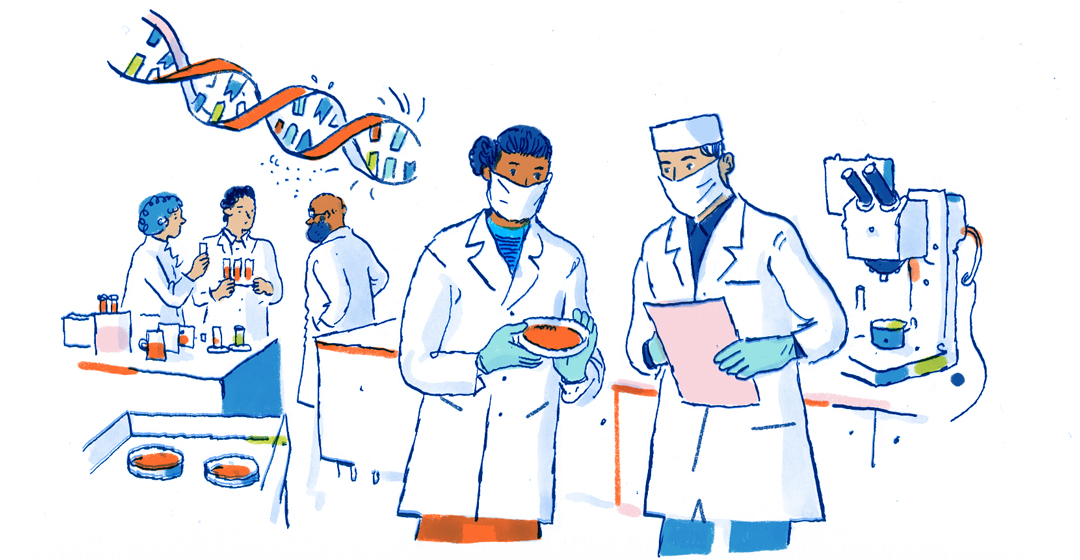
Premier Research
Rice is bringing focus, urgency and immense scholarly talent to achieve an audacious research vision — to be world-renowned in producing advances in foundational, applied, creative and humanistic research that leads to life-changing discoveries and innovations in health, sustainable futures and thriving urban communities.

“Our students — undergraduate and graduate as well as postdocs — are a big piece of the puzzle. We want to give them the tools and the strategic thinking processes for them to go and become leaders.” — Ramamoorthy Ramesh, Executive Vice President for Research
Innovations in Health
Rice brings so much to the table when it comes to innovations in health — deep collaborations with Houston medical institutions, a legacy of talented alumni in the health care field and renowned scientific discoveries. Our ambition is to be the leading nonmedical institution in health research and innovation.
Collaborative Strength
Led by Rice bioengineer Gang Bao and MD Anderson’s Dr. Jeffrey Molldrem, the new Cancer Bioengineering Collaborative harnesses the strengths of Rice and the MD Anderson Cancer Center to develop new technologies for cancer detection and therapy.

“The wide spectrum we have of expertise at Rice, from engineering and science all the way to the humanities, where they look at issues like medical humanities, the social sciences and the Baker Institute where they look at policy issues — this is one of the great things about Rice.” — Luay Nakhleh, the William and Stephanie Sick Dean of the George R. Brown School of Engineering and Computing
Big Ideas, Small Steps
To help accelerate a transition from lab to market for new health technologies, Rice’s Office of Innovation awards the One Small Step Grant. These grants provide crucial capital for projects to spin out of the university and successfully attract investment from angel investors and venture capital.
Convening Leaders
This fall, the Rice 360 Institute for Global Health Technologies convened newborn and maternal health experts, innovators and community leaders from around the world to learn, be inspired, and take collective action to improve maternal and newborn health from day one in resource-limited settings.
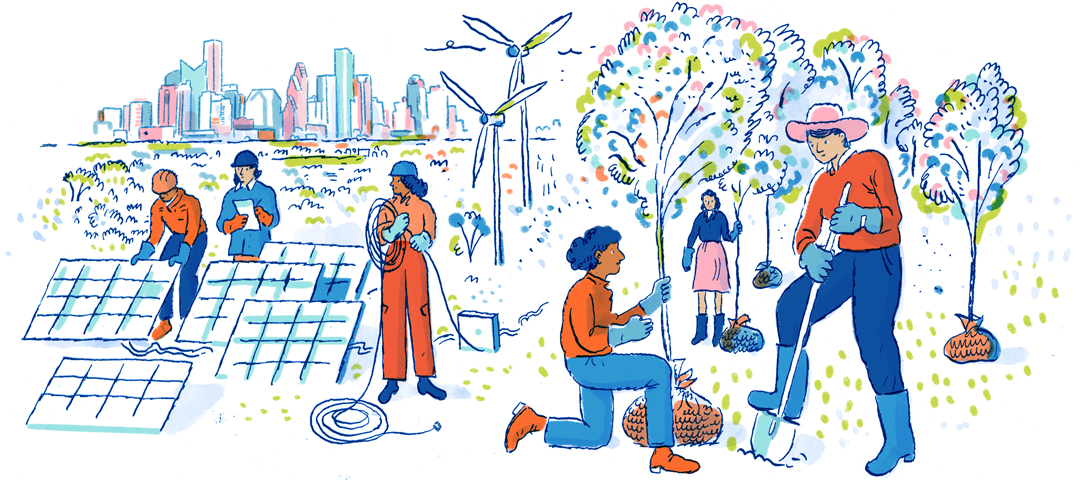
Sustainable Futures
Momentous strives to use Rice’s unique strengths and our coastal location in the energy capital of the world to collaborate on, create and employ sustainable solutions to create a more sustainable energy and environmental future — building on key efforts from our schools, our institutes and our centers.
Applied Data
Rice’s Center for Coastal Futures and Adaptive Resilience is advancing social scientific research that empowers coastal communities confronting the twin challenges of climate change and social inequality. This year, the center’s data experts mapped toxic releases and polluters in flood-prone communities ahead of hurricanes Helene and Milton.
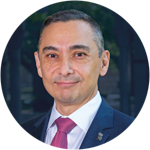
“We need to develop students through professional master’s programs who can tackle new problems and lead at work and at organizations that are changing the future.” — Peter Rodriguez, Dean of the Jesse H. Jones Graduate School of Business
Water Is Life
At the Rice WaTER Institute, Rice faculty and graduate students are focused on public health protection, including destruction of PFAS (forever chemicals) in water, protection from pathogens and endocrine disruptors that break through our treatment plants, and wastewater-based epidemiology to warn us about pandemics.
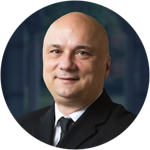
“As a school of architecture, we are particularly excited about the topic of generating a sustainable future. I think we need scientific discovery. We need the political will. But maybe more than anything else, we need imagination.” — Igor Marjanović, the William Ward Watkin Dean of Rice Architecture
Safer Batteries
Doctoral student Xi Chen is using microwave-assisted techniques to revolutionize how we recycle lithium-ion batteries. “Recycling lithium-ion batteries in an environmentally and economically sustainable way is essential for global energy security,” says Chen, who recently received the Rice Chevron Energy Graduate Fellowship in concert with Rice’s Sustainability Institute.

“We have the ability to bring energy companies, but also environmental interests, together with our outstanding faculty and students to really do the deep work to find the solutions to the challenging problems of providing the energy we need while also preserving our environment.” — Tom Killian, Dean of the Wiess School of Natural Sciences
Build Thriving Urban Communities
How can Rice help urban communities thrive? From issues with infrastructure to housing disparities and economic opportunities, Rice is pursuing consequential research to address urban challenges. Our aim is to create a more inclusive prosperity that includes a culture of creativity in the arts.
Urban Research
At the Kinder Institute for Urban Research, the Center for Housing and Neighborhoods studies the dynamics of housing and neighborhood development across the Houston region. They recently collaborated with the Houston Housing Authority to help the organization expand the number of affordable housing options for people who rely on housing choice vouchers and promote upward mobility.

“Right now, 57% of the world lives in urban communities, but by 2050 it will be 70%, so that rapid urbanization brings lots of opportunities, but also challenges. Those challenges intersect with things like climate change and migration to mean that we have to call on all of our disciplines to try to tackle these problems.” — Rachel Kimbro ’01, Dean of the School of Social Sciences

Community Education
Since 1967, the Glasscock School of Continuing Studies has been helping Houston’s populations — from ages 3 to 103 — learn and thrive. Through its Early Childhood and Elementary Education program, more than 3,000 teachers a year are trained in early childhood literacy. Those teachers impact almost 25,000 students a year.

“This component [thriving urban communities] is core to what we do at the Glasscock School. When you think about societal, educational, economic growth of a city, that is within our mission and vision.” — Robert Bruce, Dean of the Glasscock School of Continuing Studies
Strategic Catalysts
Our two catalysts — responsible artificial intelligence and empowered campus culture — are the foundational structures that support our strategic plan’s goals over the next decade. We aim to use the powerful tools of AI to promote discovery and generate new thinking, but we will do this with an ethical lens — pioneering a responsible approach to AI.

“The Rice experience is premier, excellent teaching and research, giving the same attention, the same dedication, the same devotion to each of those in every individual and in every experience.” — Amy Dittmar, the Howard R. Hughes Provost and executive vice president for academic affairs
Responsible Artificial Intelligence
We believe that Rice can be a global leader in developing, applying and understanding AI as a responsible tool that can be used to advance research and learning. We’re poised to leverage our considerable strengths in these areas to research, teach and lead in ways that promote the ethical use of AI.
Ethics, Data and AI
Rice students are learning about AI through courses such as The Ethics of Artificial Intelligence, which is taught by both philosophy and computer science faculty members, and Data, Ethics and Society, which examines the societal impacts of choices made by data science professionals and identifies best practices to protect privacy and increase societal benefits.

“Responsible AI is something we are very attuned to in the School of Humanities, especially as we have now empowered our philosophy department to develop a tech, ethics and philosophy track.” — Kathleen Canning, Dean of the School of Humanities
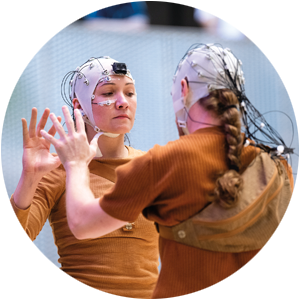
Collaborative Strength
A groundbreaking artistic collaboration between Rice, the University of Houston and Sam Houston State University was featured at the United Nations’ AI for Good Global Summit in Geneva last year. “Meeting of Minds” explores human connection through dance and neuroscience and is led by Anthony Brandt, professor of composition and theory at the Shepherd School of Music.

Emergency Response
Recently, an interdisciplinary team of Rice engineers and collaborators led by Jamie Padgett, Rice’s Stanley C. Moore Professor in Engineering, has won $1.5 million from the National Science Foundation to leverage responsible artificial intelligence and data to provide insights to emergency response organizations and communities during tropical cyclones and coastal storm events.
Empowered Campus Culture
Rice is made up of a diverse community — students, faculty, staff, alumni and engaged community members. Working together, this community will fuel each and every goal of the strategic plan.
Every staff member plays a key role in Rice’s future success.
• Creating communications that tell the story of Rice’s excellence in research, teaching, community and global engagement • Beautifying our campus • Supporting undergraduate and graduate student services • Building key partnerships • Improving the technologies that fuel innovation • Maintaining our facilities, residential colleges and labs • Ensuring the smooth operation of our budget and administrative functions

